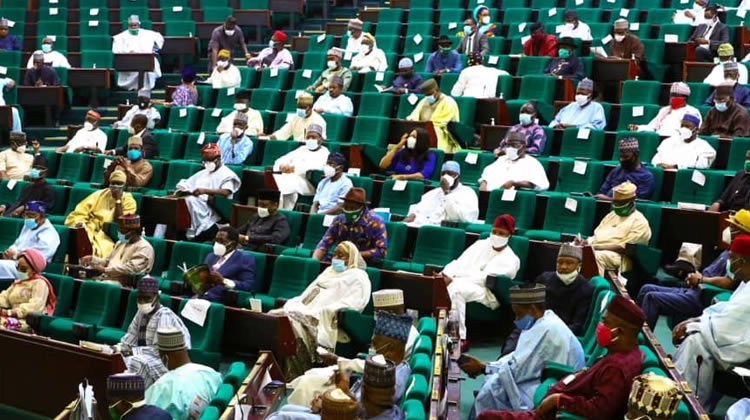News
Reps Approve Tinubu’s $2.35bn External Loan Request

The House of Representatives on Wednesday approved President Bola Tinubu’s request to secure a total of $2.347bn from the international capital market to part-finance the 2025 budget deficit and refinance maturing Eurobonds.
The approval followed the consideration and adoption of a report presented by the House Committee on Aids, Loans, and Debt Management, chaired by Hon. Abubakar Hassan Nalaraba, during plenary presided over by Speaker Tajudeen Abbas.
Since assuming office in May 2023, President Bola Tinubu’s administration has secured substantial external financing to support government programmes and fiscal operations.
Between May 2023 and May 2025, Nigeria obtained approximately $7.2bn in external loans from the World Bank, aimed at bolstering key economic reforms and development initiatives. In addition, the government received approval for a $1 billion facility from the African Development Bank, expected to be disbursed between 2024 and 2025.
READ ALSO:Reps Move To Regulate Cryptocurrency, POS Operations
Further strengthening its external financing portfolio, the House of Representatives in October 2025 approved a new borrowing plan, including $1.23bn to part-finance the 2025 budget and a $500m debut Sovereign Sukuk to be issued in the international capital market.
These financing initiatives form part of the administration’s broader strategy to bridge budget deficits, refinance maturing debts, and stimulate economic growth through targeted investments.
According to the committee’s report, “The new borrowing plan comprises $1.23bn to fund the 2025 budget deficit and $1.12bn to refinance Nigeria’s Eurobond maturing in November 2025.”
The Deputy Speaker, Benjamin Kalu, who presided over the Committee on Supply where the report was considered, put the request before the House at plenary.
READ ALSO:Reps Move To Regulate Cryptocurrency, POS Operations
“The Committee on Supply considered the request of Mr President and made these recommendations. Do we accept these recommendations,” he asked, to which members replied in the affirmative.
Adopting the recommendations of the committee, the House authorised the Federal Government to “Implement the external borrowing component of the 2025 Appropriation Act amounting to ₦1.84tn (approximately $1.23bn) at the budget exchange rate of ₦1,500 to $1.”
Lawmakers also approved for the government to access the loans through Eurobond issuance, loan syndication, bridge financing facilities, or direct borrowing from international financial institutions.
In addition, the House endorsed President Tinubu’s proposal to issue Nigeria’s first-ever Sovereign Sukuk bond of up to $500m in the international capital market, with or without a credit guarantee.
Recall that President Tinubu, in his earlier correspondence to the National Assembly, explained that the borrowing plan was necessary to bridge the gap between projected revenue and expenditure in the 2025 fiscal year and to enable the government to meet its debt obligations as they fall due.
News
NAF Neutralizes Bandits At Turba Hill, Kachalla Dogo Sule Camps

The Nigerian Air Force, (NAF, under the auspices of the Air Component of Operation FANSAN YAMMA, Sector 2, has neutralized armed banditry through the execution of two high-impact precision Air Interdiction (AI) missions.
Air Commodore Ehimen Ejodame, Director of Public Relations and Information, Headquarters, Nigerian Air Force, said in a statement that the armed bandits met their Waterloo following credible, multi-source intelligence at Turba Hill and Kachalla Dogo Sule’s Camp, both in Tsafe Local Government Area of Zamfara State.
The statement said the first strike targeted Turba Hill, a confirmed bandit hideout, adding that persistent intelligence, surveillance, and reconnaissance revealed significant human activity and an operational zinc-roofed structure assessed to be central to the enclave’s activities.
READ ALSO:
Post-strike battle damage assessment confirmed the complete destruction of the structure and the neutralization of several bandits.
“The second AI mission was conducted at Kachalla Dogo Sule’s Camp, a notorious bandit stronghold identified as a key IED manufacturing and operational hub. Intelligence had linked the camp to the planning and execution of recent IED attacks along the Dan Sadau–Magami axis,” the statement said.
It added that the precision strike successfully engaged multiple active structures within the enclave, triggering intense fires that destroyed the facilities and neutralized several bandits, effectively crippling the group’s IED production and deployment capability.
READ ALSO:
The operations, according to the statement, reaffirm the Nigerian Air Force’s unwavering commitment, working in close coordination with other components of Operation FANSAN YAMMA, to deny criminal elements safe havens, degrade their combat effectiveness, and support ongoing joint efforts to restore lasting peace and security across the North-West and the nation at large.
News
Doris Ogala: How Pastor Chris Knelt Before Church, Begged For Forgiveness [Video]

Pastor Chris Okafor, founder of Grace Nation Bible Ministry, has reportedly apologized and asked for forgiveness following allegations made against him by Nollywood actress Doris Ogala.
In a video shared on Facebook by Ogala on Sunday, the cleric was seen kneeling before members of his church as he expressed remorse over what he described as mistakes made in the past.
Recall that the Nollywood actress had called Chris Okafor out after he dumped her for another woman despite promising her marriage.
READ ALSO:Court Frees Armed Robbery Suspect Over Absence Of Prosecution Witness
While maintaining that many of the allegations against him were untrue, Pastor Chris said he was apologizing to anyone who felt offended by his actions.
“I am not joining issues,” he said, referring specifically to Doris Ogala. “Mistakes have been made in the past, and I tender my apology to everybody. But everything that was said is not true. There are so many lies in most of the things that were said.”
Despite disputing the claims, Pastor Chris reiterated his willingness to make amends, stating that he was ready to offer restitution to any woman he may have offended.
READ ALSO:Tinubu Reportedly Drops Nominees Displaying ‘Sense Of Entitlement’
“To Doris Ogala, I will apologize, and I also apologize to everyone. I am ready to make a restitution to anyone and anybody, any lady, anywhere I’ve offended,” he said.
The pastor acknowledged his imperfections and appealed to the congregation and the public for forgiveness and prayers, noting that he had experienced a “new beginning” following the influence of senior Christian leaders he described as “fathers of faith.”
“I’m kneeling down before everyone and before the church. Forgive me. You can judge me. Pray for me,” he added.
Watch the video here
News
Actress Doris Ogala Rejects Alleged $10,000 Settlement From Pastor Chris Okafor [VIDEO]

Popular Nollywood actress, Doris Ogala, has rejected the $10,000 settlement from the founder of Grace Nation Bible Ministry, pastor Chris Okafor.
The actress made this known in a video made on Tuesday December 23 2025, and shared on her Instagram page Saturday morning.
Speaking in the video, Ogala stated that the clergy man brought the money as settlement and also begged her to publicly debunk everything she had said about him.
While revealing the outcome of their table talks, she alleged that pastor Chris urged her to lie that she was sent by some pastors to lie against him.
READ ALSO:Tinubu Reportedly Drops Nominees Displaying ‘Sense Of Entitlement’
“Chris, you’ve seen me finish ooo, honestly, you have seen me finish. This is $10,000, he gave me this $5,000 last night after we talked and he was pleading and all that. Then he gave me this $5,000 this afternoon.
“This man is just mad. You can imagine this man wanted me to come and say that all the pastors or a few pastors
were the ones who sent me to come and fight him. I should put it on the pastors’ head, then I will come out and debunk everything that I have said. Come on, you want me to take a fool? After all that I have said?
“Chris, you see this money that you gave me, it will never be a transaction of anything in my life or transaction of any part of my body. I cancelled every evil altar that you are coming from. He that is in me and protecting me is greater. I deliberately collected this money to tell you that everything i have said is the truth. I’m not lying and I will never lie. Chris, I’m not as cheap as you are, ten thousand dollars is nothing to me, and I’m not blackmailing you but I wanted the world to see that you actually gave me money. Chris, I will not lie on any pastor or put it on any pastor’s head. So, this is the money he gave to me with the Zenith bank envelope just now. Today is 23 December 2025, and I’m making this video by 5;39 pm”, she stated.
READ ALSO:FG Declares Public Holidays For Christmas, New Year Celebrations
According DAILY POST, the development came a few days after Doris Ogala disclosed that table talks and resolution is ongoing between them.
Recall that Doris called Chris Okafor out after he dumped her for another woman despite promising her marriage.
Watch the video

 News5 days ago
News5 days agoFULL LIST: Churches That Don’t Celebrate Christmas

 News5 days ago
News5 days agoJUST IN: Kano Lawmaker, Sarki Aliyu Daneji, Dies Hours After Colleague’s Passing

 Headline3 days ago
Headline3 days agoJUST IN: US Forces Bomb Terrorists Camps In Nigeria

 News4 days ago
News4 days agoOkpebholo Slams ₦25bn Libel Suit On Edo PDP Chairman

 Headline3 days ago
Headline3 days agoUS Dept Of War Shares Video Of Air Strikes In Nigeria

 Entertainment5 days ago
Entertainment5 days agoAFCON 2025: Davido Wins $96,000 After Super Eagles Beat Tanzania

 News5 days ago
News5 days ago7 Health Risks Of Owning A Cat

 News5 days ago
News5 days agoSheikh Gummi Sues Two Over Alleged False Facebook Publication

 Headline5 days ago
Headline5 days agoCoup: Guinea-Bissau Junta Releases Six Held Opposition Politicians

 News3 days ago
News3 days agoPHOTOS: SGF George Akume Weds Ooni’s Ex-Queen


























